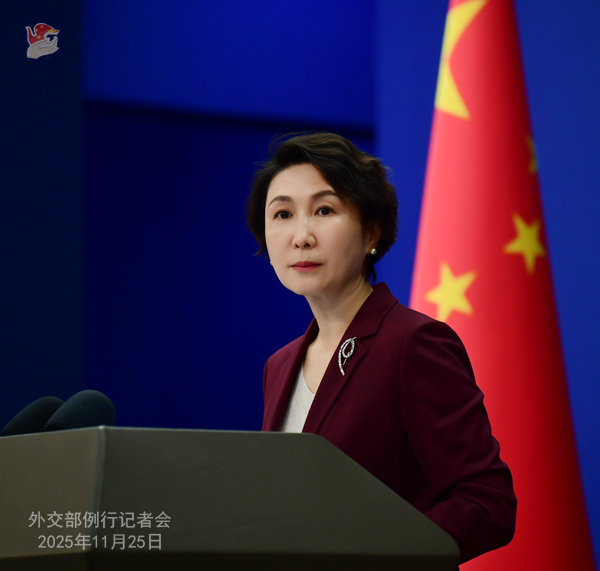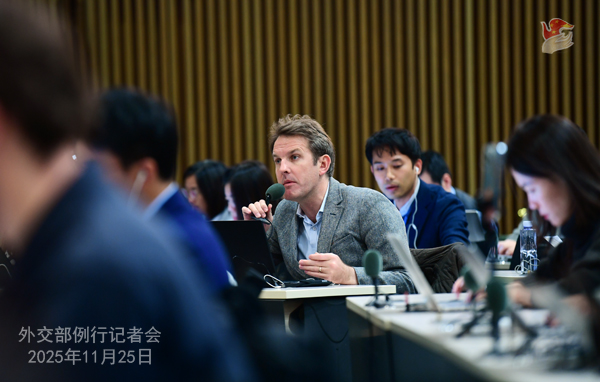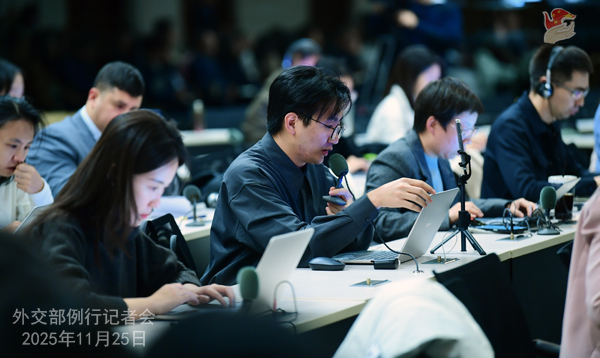
People’s Republic of China


Global Times: Japanese Prime Minister Takaichi’s erroneous remarks on Taiwan is met by outrage from the Chinese people. There are, however, individuals in Japan who claimed that it’s the Republic of China (ROC) rather than the People’s Republic of China (PRC) who accepted Japan’s surrender, so the PRC is not in a position to discuss the Taiwan question. What’s your comment?
Mao Ning: The ones who make such claims either do not know the history or deliberately seek to distort it and disregard international law.
In 1945, Japan signed the Instrument of Surrender, explicitly undertook to carry out the provisions of the Potsdam Proclamation in good faith and unconditionally return Taiwan to China. China resumed exercise of sovereignty over Taiwan and recovered Taiwan both in law and in practice. In 1949, the PRC government replaced the ROC government. This is a change of government in which China, as a subject under international law, did not change and China’s sovereignty and inherent territorial boundaries stayed unchanged. Thus, the government of the People’s Republic of China naturally and fully enjoys and exercises China’s sovereignty, including sovereignty over the Taiwan region. The 1972 Sino-Japanese Joint Statement states that the Government of Japan recognizes the Government of the People’s Republic of China as the sole legal Government of China.
There is only one China in the world, and Taiwan is an inalienable part of China’s territory. This is an ironclad fact and shall not be bent or distorted.
NHK: According to a readout released by the Chinese side, the Chinese and U.S. presidents spoke on the phone last night. Was the phone call initiated by China or the U.S.? How long did it last? What is China’s comment on the outcomes of the phone call?
Mao Ning: The Chinese and U.S. presidents have maintained regular interactions during President Trump’s second term. As far as I know, this phone call was initiated by the U.S. side. The atmosphere of the call was positive, cordial and constructive. Communication between the two presidents on issues of mutual interest is highly important to the steady development of China-U.S. relations.
PTI: An Indian woman hailing from Arunachal Pradesh has said that she was on a transit to Japan from London and was detained in Shanghai for about 18 hours simply because of her Indian passport. Apparently, the Indian consular staff have to intervene to get her released. And also India has launched a protest regarding this particular issue. Can you just please comment on this?
Mao Ning: Zangnan is China’s territory. The Chinese side has never recognized the so-called “Arunachal Pradesh” illegally set up by India. On the individual case you mentioned, according to what we’ve learned, during the entire time, China’s border inspection authorities carried out checks procedures in accordance with laws and regulations, the law enforcement was impartial and non-abusive, the lawful rights and interests of the person concerned were fully protected, no compulsory measures were taken on her, and there was no so-called “detaining” or “harassing.” The airline provided her with resting facilities and meals. For anything more specific, I’d refer you to competent authorities.
Bloomberg: Just after the phone call between President Xi and President Trump, there was a phone call between President Trump and Prime Minister Takaichi of Japan. And they discussed the Japan-U.S. alliance and its importance for the region and other bilateral issues, some of which weren’t announced. Does China have a reaction to that phone call? And do you have any concern about Japan and the U.S. and their views toward Taiwan?
Mao Ning: The phone call between the leaders of the U.S. and Japan is a matter between the U.S. and Japan. I have no comment on that. The Taiwan question is China’s internal affair which brooks no interference by any external forces.

PTI: A follow-up on what you spoke about the particular incident in Shanghai. India reportedly launched protest in this regard. India too has rejected China’s claims on Arunachal Pradesh. Can you please comment on that?
Mao Ning: Zangnan is China’s territory, and China does not recognize the so-called “Arunachal Pradesh” illegally established by India. As for the individual case you mentioned, I’ve shared relevant information just now. Let me point out that having border checks on people entering and exiting a country and carrying out law enforcement according to the specific situation of the entry or exit is the usual practice of border enforcement authorities of countries across the world.
Bloomberg: Since the relations between Japan and China got worse over the last two weeks, Chinese authorities have frozen its regulatory reviews of Japanese movies for airing in Chinese movie theaters and more than 20 concerts featuring Japanese musicians have been canceled across Chinese cities including in Beijing. Is this part of the Chinese government’s retaliatory response to Japan? Is there an official directive or guideline on Japanese cultural imports? And how long do you expect the suspension of films and shows to last?
Mao Ning: Exchanges and cooperation between China and Japan have recently been affected because of the erroneous remarks made by the Japanese Prime Minister Sanae Takaichi on Taiwan. The remarks gravely hurt the sentiments of the Chinese people and poisoned the atmosphere for exchanges between the two countries. Japan needs to redress its wrongdoing at once and stop creating irritations on China-related issues.
China News Service: This week, the 30th Session of the Conference of the States Parties of the Chemical Weapons Convention is being held in The Hague, Netherlands. China has submitted China’s Position Paper on Upholding Multilateralism, Solidarity and Cooperation at the OPCW to the Conference. Could you share more information with us?
Mao Ning: The Organisation for the Prohibition of Chemical Weapons (OPCW) is an important pillar of global security governance. Since the organisation’s establishment 28 years ago, its States Parties have made historic achievements in chemical weapons disarmament and international cooperation in the spirit of multilateralism, solidarity and cooperation. In recent years, the OPCW has seen a growing tendency toward politicization and division into blocs, with diminishing dialogue and consultation and rising confrontation and antagonism. The authority of the Chemical Weapons Convention is eroded, which has caused deep concern among the States Parties.
The position paper submitted by China is guided by the Global Governance Initiative and appeals to all States Parties to adhere to the purpose and goals of the Chemical Weapons Convention, uphold multilateralism, maintain the tradition of consensus-building, address hotspot and contentious issues through dialogue and consultation, safeguard the legitimate rights and interests of developing countries and enhance solidarity and coordination.
We look forward to working with all parties to continue building consensus and enable the OPCW to play a greater role in global security governance.
Bloomberg: Today, the Japanese government produced a statement in response to a question from a Japanese MP speaking about the policy regarding existential threats to the Japanese state. The statement was that there is no change to previous Japanese policies regarding either on existential crisis or on Japan’s use of collective self-defense. Does the Chinese government accept the Japanese government’s statement that they haven’t actually changed any of their policies or does China expect Japan to do more on this?
Mao Ning: Japanese officials have kept mentioning the Japanese government’s “consistent position” or repeating that their position is “unchanged.” We have explicitly asked the Japanese side what they mean exactly by this so-called “consistent position” and whether they can fully articulate this “consistent position” to the public? The Japanese side has been repeating the mere notion of an unchanged position but nothing it says ever touched upon the real issue. Essentially, the Japanese side has been deliberately evading China’s call for it to retract the erroneous remarks and hoping that somehow the issue would resolve itself. We could not but question whether the Japanese side does have the sincerity and whether it will take action to do serious soul-searching and correct its wrongdoing.




